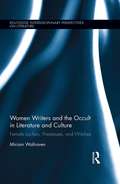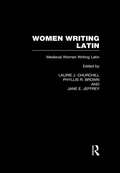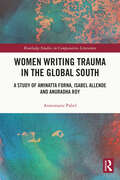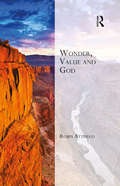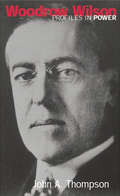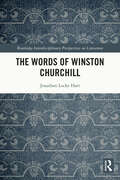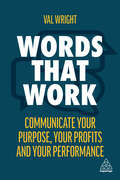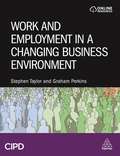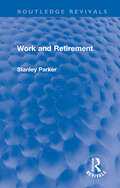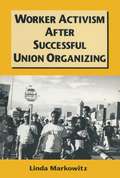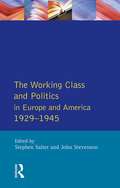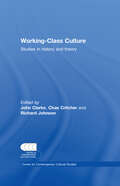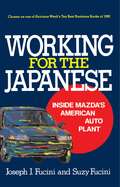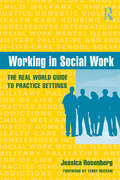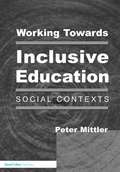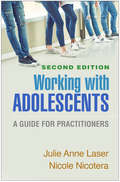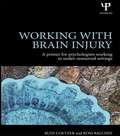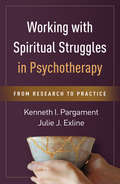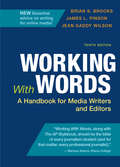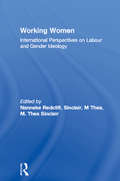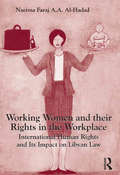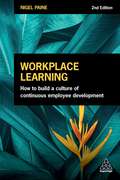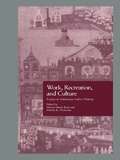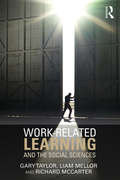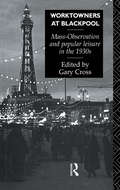Special Collections
Benetech’s Global Certified Accessible Titles
Description: Benetech’s GCA program is the first independent third-party EPUB certification to verify ebook accessibility. By creating content that is born accessible, publishers can meet the needs of all readers. Learn more: https://bornaccessible.benetech.org/
- Table View
- List View
Women Writers and the Occult in Literature and Culture
by Miriam WallravenExamining the intersection of occult spirituality, text, and gender, this book provides a compelling analysis of the occult revival in literature from the 1880s through the course of the twentieth century. Bestselling novels such as The Da Vinci Code play with magic and the fascination of hidden knowledge, while occult and esoteric subjects have become very visible in literature during the twentieth century. This study analyses literature by women occultists such as Alice Bailey, Dion Fortune, and Starhawk, and revisits texts with occult motifs by canonical authors such as Sylvia Townsend Warner, Leonora Carrington, and Angela Carter. This material, which has never been analysed in a literary context, covers influential movements such as Theosophy, Spiritualism, Golden Dawn, Wicca, and Goddess spirituality. Wallraven engages with the question of how literature functions as the medium for creating occult worlds and powerful identities, particularly the female Lucifer, witch, priestess, and Goddess. Based on the concept of ancient wisdom, the occult in literature also incorporates topical discourses of the twentieth century, including psychoanalysis, feminism, pacifism, and ecology. Hence, as an ever-evolving discursive universe, it presents alternatives to religious truth claims that often lead to various forms of fundamentalism that we encounter today. This book offers a ground-breaking approach to interpreting the forms and functions of occult texts for scholars and students of literary and cultural studies, religious studies, sociology, and gender studies.
Women Writing Latin
by Laurie J. Churchill and Phyllis R. Brown and Jane E. JeffreyThis book is part of a 3-volume anthology of women's writing in Latin from antiquity to the early modern era. Each volume provides texts, contexts, and translations of a wide variety of works produced by women, including dramatic, poetic, and devotional writing. Volume Two covers women's writing in Latin in the Middle Ages.
Women Writing Trauma in the Global South
by Annemarie PabelThrough exploring complex suffering in the writings of Aminatta Forna, Isabel Allende and Anuradha Roy, Women Writing Trauma in the Global South dismantles conceptual shortcomings and problematic imbalances at the core of existing theorizations around psychological trauma. The global constellation of women writers from Sierra Leone, Chile and India facilitates a productive analysis of how the texts navigate intertwined experiences of individual and systemic trauma. The discussion departs from a recent critical turn in literary and cultural trauma studies and transgresses many interrelated boundaries of geocultural contexts, language and genre. Discovering the role of literary forms in reparative articulation and empathic witnessing, this critical intervention develops new ideas for an inclusive conceptual expansion of trauma from the global peripheries and contributes to the ongoing debate on marginalized suffering.
Wonder, Value and God
by Robin AttfieldThis book relates the value present in the natural world and in human creativity to an underlying purpose which it traces in creation. It opens by invoking the wonder aroused by nature's value and celebrated by poets, and moves to a cosmic purpose as the best explanation of this value. Natural evils are considered and set in their evolutionary context. Human creativity is later related to inspiration, and to traditional theistic teaching about the purpose of human life. Criticisms of "the value approach" are considered, together with the quest for meaning, and fears that Darwinism undermines it, which are found to be illusory. New ground is broken through this response to the spectre of bleakness. The author's previous studies of meaningful work are applied to the question of the nature of a worthwhile life and life's meaning. While the world's value is argued to point to creation by a transcendent lover of value, human beings are shown to be capable of augmenting that value through their creativity (not least through activities such as craftsmanship and gardening). In integrating the themes of value, creativity and purpose, the book contributes a new synthesis to the literature of philosophy, environmental studies and theology.
Woodrow Wilson
by John A. ThompsonMost famous in Europe for his efforts to establish the League of Nations under US leadership at the end of the First World War, Woodrow Wilson stands as one of America’s most influential and visionary presidents. A Democrat who pursued progressive domestic policies during his first term in office, he despised European colonialism and believed that the recipe for world peace was the self-determination of all peoples, particularly those under the yoke of the vast Ottoman and Austro-Hungarian Empires. His efforts to resist heavy reparations on Germany fell on deaf ears, while the refusal of France, Russia and Britain to accept a League of Nations led by America, together with the US Senate’s refusal to ratify the League, led to its ultimate failure. Woodrow Wilson has traditionally been seen by both admirers and critics as an idealist and a heroic martyr to the cause of internationalism. But John Thompson takes a different view, arguing that Wilson was a pragmatist, whose foreign policy was flexible and responsive to pressures and events. His conclusion, that Wilson was in fact an exceptionally skilful politician, who succeeded in maintaining national unity whilst leading America onto the world stage for the first time in its history, offers a challenging interpretation for anyone interested in the man and his era.
The Words of Winston Churchill
by Jonathan Locke HartThe Words of Winston Churchill, a study that ranges over the course of a rich, controversial and remarkable career, is about the power and art of his language as a writer and speaker. Churchill used words as the greatest of poets and orators do, and did so in Parliament and for the people, Britain and the empire, in war and peace, facing the changes in the world, and resisting Hitler and the Nazis. Drawing on the traditions of poetics, rhetoric and textual commentary, the study concentrates on Churchill’s writing and is sensitive to texts and contexts and to the archive. A central matter is Churchill speaking in Parliament and the reception of his speeches there for over six decades, although his work as a writer and a speaker outside the House of Commons is also important. Churchill speaks to the House, the people, Britain, the Empire, the Commonwealth and the world and, in crisis, defends freedom and democracy.
Words That Work
by Val WrightChallenge the 'business as usual' rhetoric and create a stronger narrative in today's purpose-driven society with Words That Work.When a Broadway or West End show opens on its first night, everyone knows their lines. When it's time for the Super Bowl, the Olympics or World Cup, the athletes have prepared with precision. Yet in board rooms, company away days and conferences around the world, repeatedly leaders are starting off badly when millions in revenue are at stake. The most successful executives know that they need to invest their time in preparing in a thoughtful and intentional way to continuously improve their knowledge and communication skills so that they can effectively lead their organizations. Words That Work will help leaders benefit from the strategies, language and tools of CEOs who know how to speak the right language at the right time. But Words That Work does more than that. It calls on leaders to challenge the 'usual' business conversations. Val Wright turns a number of familiar communication approaches on their head, and shows the reader how to question, contest and change traditional language skilfully and persuasively.
Work and Employment in a Changing Business Environment
by Stephen Taylor and Graham PerkinsWork and Employment in a Changing Business Environment is the definitive textbook for the new CIPD Advanced Level 7 module. It provides students with an understanding of the major contemporary trends in the HR business environment and discussion of significant areas of HR and Learning and Development (L&D) activity that derive from or are given additional prominence as a result of environmental developments.It provides students with an understanding of ways in which major, long-term environmental developments affect employment, work and people management in organizations as well as a thorough grounding in current and short-term developments in the people management environment. These areas include globalisation, technology, the economy, labour markets, society, politics, public policy and employment regulation. This book also includes expert coverage of how change, innovation and creativity can promote improvements in organisational productivity. Most importantly, this brand new textbook covers the key elements that students on HR masters courses will need in their future careers including flexibility, agility and resilience. productivity, ethics and values, sustainability, equality, diversity and inclusion, wellbeing and working internationally. Case studies and examples demonstrate how the theory applies in practice and pause and review boxes will help students think critically about the content. Work and Employment in a Changing Business Environment is ideal reading for all postgraduate students on both CIPD and non-CIPD accredited courses. Online supporting resources include powerpoint slides for every chapter.
Work and Retirement
by Stanley ParkerIn the early 1980s world recession and widespread unemployment had accentuated an existing trend – more people retiring from work early and living longer after doing so. Some were adequately prepared for a life of well-earned ‘leisure’ in retirement, but too many were not. The policies of employers, unions and governments on retirement needed to be challenged in societies where work opportunities were collapsing but where leisure activities and values were not yet strong enough to take their place. Originally published in 1982, Dr Parker, a sociologist, provides a careful and critical examination of what we knew about retirement and discusses possible alternative answers to the various problems involved at the time. The history of retirement is first considered, followed by a conceptual analysis of types of retirement. There are chapters on preparation for retirement, the capacity of older people to work, and on the varying experiences of retirement. Separate consideration is given to the question of work after retirement age and whether retirement is actually experienced as leisure. The concluding chapter examines various policy alternatives for dealing with the problems raised earlier in the book. Work and Retirement was intended for students of industrial sociology and industrial psychology, for personnel and human resource professionals, for trade unionists and for all those who had an interest in understanding the developments in the field of retirement and the older working population. Now it can be read in its historical context.
Worker Activism After Successful Union Organizing
by Linda MarkowitzShows how different levels of worker participation during a union organizing campaign influence the perceptions and actions of those same workers after the campaign ends, and, thereby, the long-term effectiveness and success of the organizing effort. Drawing on historical and current examples, the author analyzes the political and economic contexts within which today's unions are organizing, including a detailed examination of the impact of the Wagner Act.
Working Class and Politics in Europe and America 1929-1945, The
by John Stevenson and Stephen SalterThis volume contains a series of essays which examines various regimes and working classes of such countries as Italy, France, Poland, the USA, the Soviet Union and Great Britain in the early 20th century.
Working Class Culture
by CccsFirst published in 2013. Routledge is an imprint of Taylor & Francis, an informa company.
Working for the Japanese
by Joseph J. FuciniThis book is the product of two years of research and over 150 interviews with workers and managers at the Mazda-Flat Rock plant, UAW representatives, state and local government officials, and residents of the Downriver area.
Working in Social Work
by Jessica RosenbergAfter graduating, students in social work are faced with the daunting and stressful decision of choosing their specialty from the many that are available to them. JessicaRosenberg has designed this guidebook to make this process easier, providing students with real world and practical information about what it is really like to work as a social worker. Each chapter covers a different practice setting, such as child welfare, gerontology, and addictions, and follows the same format. The Field Overview and Forecast describes the social worker’s role, scope of services, and emerging issues and employment trends. The Critical Issues section consists of an interview with an established professional in his or her chosen field, offering a look into their personal journeys as they progressed through their careers. A vignette written by a practitioner in their area of specialty makes-up the First Person Narrative, providing the reader with a look at the joys and challenges of working in that particular field. Each chapter then concludes with helpful resources to learn more, such as books and websites, as well as information about specialty credentials and educational programs and centres. Those entering the social work field will find this an indispensible guide as they select their specialty and begin their career.
Working Towards Inclusive Education
by Peter MittlerThis book provides a clearly written, wide-ranging overview of current key issues and challenges arising from the implementation of more inclusive policies and provision in education in this country and internationally. The author sets policies for inclusive schools in the broader contexts of current policies which aim to reduce poverty and social exclusion, and the wider global background of the United Nations drive to promote 'Education for All'. The book draws a distinction between integration and inclusion and provides a critical analysis of the government's Program of Action and the revised National Curriculum and their implications for schools, pupils and families.
Working with Adolescents, Second Edition
by Julie Anne Laser and Nicole NicoteraNoted for its multisystemic–ecological perspective, this accessible text and practitioner resource has now been revised and expanded with 60% new material. The book provides a comprehensive view of adolescent development and explores effective ways to support teens who are having difficulties. The authors examine protective and risk factors in the many contexts of adolescents' lives, from individual attributes to family, school, neighborhood, and media influences. Assessment and intervention strategies are illustrated with diverse case examples, and emphasize a social justice orientation. Useful pedagogical features include end-of-chapter reflection questions and concise chapter summaries. New to This Edition *Incorporates current research on brain development, resilience, gender diversity, mental health care, and more. *Chapters on new topics: the adolescent brain, trauma, and suicide and self-injury. *Fully rewritten chapters on substance use, queer youth, justice-involved youth, and the joys of working with adolescents. *Reflects the unique contexts and challenges facing Generation Z.
Working with Brain Injury
by Rudi Coetzer and Ross BalchinThis book provides a hands-on resource for the development of essential skills and competencies in clinical neuropsychology. On a very practical level it addresses a question frequently asked by students, trainees, interns, and newly qualified psychologists: what do I need to know in order to perform the everyday tasks involved in clinical neuropsychology? The authors distil, from a vast knowledge base, the practical skills and knowledge needed to lay the foundations for working with brain-injured patients, especially within the developed and developing world where time and resources are limited. The book is divided into three main sections: Basic Foundations, Clinical Practice, and Professional Issues. Together these sections cover 18 fundamental topics, each representing a key part of the life of a practitioner. Each chapter contains practical tips, points for reflective practice, and suggested further reading, with a particular emphasis on issues pertaining to working in under-resourced clinical environments. The book draws upon landmark academic papers and textbooks, and also the authors’ experiences of working in state hospitals in both South Africa and the National Health Service in the United Kingdom. Working with Brain Injury will be essential reading for clinical psychology trainees and their supervisors, for newly qualified psychologists in clinical settings, and for students and practitioners in other clinical professions seeking an introduction to clinical neuropsychology.
Working with Spiritual Struggles in Psychotherapy
by Kenneth I. Pargament and Julie J. ExlineDoes my life have any deeper meaning? Does God really care about me? How can I find and follow my moral compass? What do I do when my faith is shaken to the core? Spiritual trials, doubts, or conflicts are often intertwined with mental health concerns, yet many psychotherapists feel ill equipped to discuss questions of faith. From pioneers in the psychology of religion and spirituality, this book combines state-of-the-art research, clinical insights, and vivid case illustrations. It guides clinicians to understand spiritual struggles as critical crossroads in life that can lead to brokenness and decline--or to greater wholeness and growth. Clinicians learn sensitive, culturally responsive ways to assess different types of spiritual struggles and help clients use them as springboards to change.
Working Women
by M. Thea Sinclair and Nanneke RedcliftAs the female labour force continues to expand, the terms on which women participate remain a considerable problem. Working Women presents a detailed examination of women's position in the paid workforce in a variety of first and third world countries and identifies the common cultural and economic factors which create disadvantage.
Working Women and their Rights in the Workplace
by Naeima Faraj Al-HadadThis book addresses women’s rights to work and motherhood in Libya from a legal and international human rights perspective. In an attempt to solve the problem posed by the perception that there is an unsolvable conflict between the right of women to work and their right to motherhood, the author considers how these two sets of rights, as protected under international human rights law, can and should be recognised and promoted within the Libyan legal system. Including first-hand accounts of experiences of Libyan women, the study voices their struggle for their rights as guaranteed by domestic law, international conventions and Islam. Providing a rare insight into a region striving to find its new identity, the author assesses the adequacy of existing Libyan laws and, where warranted, offers proposals for legislative amendments to Libyan policy makers and its new Parliament at such a crucial time in the nation’s history.
Workplace Learning
by Nigel PaineHow can I develop an effective workplace learning culture to drive employee and business success? This new edition of Workplace Learning provides the knowledge and tools to create an outstanding learning culture in the new world of work.It's no longer enough for Learning and Development professionals to only offer a catalogue of workplace learning courses: competing effectively in today's business environment requires organizations and their employees to adapt and learn daily. Providing an evidence-based model for identifying key areas of focus and measuring success, Workplace Learning is a practical guide that shows how to build and embed a culture that continuously encourages and engages employees in learning and achieve business success. The updated second edition features new material on organizational and self-determined learning, and case studies from Microsoft, Novartis and PwC. Packed with practical suggestions, tools and tips, Workplace Learning is an essential resource for establishing an outstanding continuous learning culture in all parts of the organization.
Work, Recreation, and Culture
by Martin Henry Blatt and Martha K. NorkunasThe essays in this volume focus on the role of women in the work force. They explore how organized sports, social associations of all kinds and the educational system faced by the children of worker were profoundly linked to work place and community activism. They examine why radical labor organizations that could win major strikes often could not sustain themselves as permanent institutions. Finally, the essays argue that simultaneous leadership changes in management and labor in the auto industry were less the result of internal conflicts than needed structural adjustments to changing economic and political realities. Interwoven into all of the essays is the intricate dynamic between immigrant and native-born, between different immigrant waves and the groups, and between workers at different skill levels. Work, Recreation, and Culture enriches and expands the established labor narratives.
Work-Related Learning and the Social Sciences
by Gary Taylor and Liam Mellor and Richard McCarterWork-Related Learning and the Social Sciences provides a clear and accessible introduction to the theory and practice of work. Written in a student friendly style, it makes use of the following: Theoretical Perspectives: The theoretical foundations of identity, power, community, citizenship, experiential learning and a range of employability skills provide frameworks for the chapters. Key issues: The book addresses such issues as: How are people socialised at work? Why does conflict occur at work? What types of control are exerted at work? What can we learn about our communities from the work we do? How can we develop our employability skills? Sector examples: Extensive use is made of examples of the working practices of teachers, social workers, police officers, civil servants, third sector workers as well as from people engaged in low skilled work. The student voice: The student voice draws upon the relationship between their own experiences of work and the key issues covered in the book. Written as an introductory text for students studying the social sciences, it deals with the ways in which students can appreciate the sociology and politics of work and develop an understanding of their own skills and employability. This book is particularly relevant to students studying work-related learning as part of their social science degrees and to those who wish to enhance their employability and prospects in graduate level employment.
Worktowners at Blackpool
by Gary CrossGary Cross publishes the findings of this largely forgotten study by the Mass-Observers who followed the annual pilgrimage of labourers to Blackpool, hoping to discover what attracted workers to this centre of Victorian culture.
